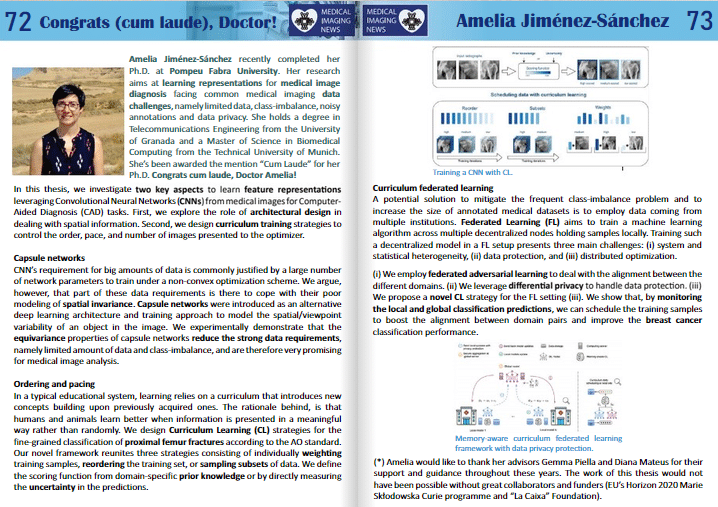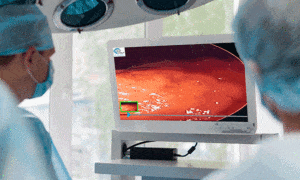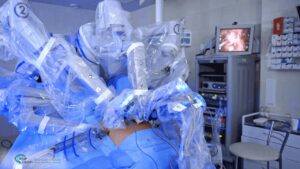This article by Amelia Jiménez-Sánchez was first published on Computer Vision News of November 2021.
Amelia Jiménez-Sánchez recently completed her Ph.D. at Pompeu Fabra University. Her research aims at learning representations for medical image diagnosis facing common medical imaging data challenges, namely limited data, class-imbalance, noisy annotations and data privacy. She holds a degree in Telecommunications Engineering from the University of Granada and a Master of Science in Biomedical Computing from the Technical University of Munich. She’s been awarded the mention “Cum Laude” for her Ph.D. Congrats cum laude, Doctor Amelia!
In this thesis, we investigate two key aspects to learn feature representations leveraging Convolutional Neural Networks (CNNs) from medical images for ComputerAided Diagnosis (CAD) tasks. First, we explore the role of architectural design in dealing with spatial information. Second, we design curriculum training strategies to control the order, pace, and number of images presented to the optimizer.
Capsule networks
CNN’s requirement for big amounts of data is commonly justified by a large number of network parameters to train under a non-convex optimization scheme. We argue, however, that part of these data requirements is there to cope with their poor modeling of spatial invariance. Capsule networks were introduced as an alternative deep learning architecture and training approach to model the spatial/viewpoint variability of an object in the image. We experimentally demonstrate that the equivariance properties of capsule networks reduce the strong data requirements, namely limited amount of data and class-imbalance, and are therefore very promising for medical image analysis.
Ordering and pacing
In a typical educational system, learning relies on a curriculum that introduces new concepts building upon previously acquired ones. The rationale behind, is that humans and animals learn better when information is presented in a meaningful way rather than randomly. We design Curriculum Learning (CL) strategies for the fine-grained classification of proximal femur fractures according to the AO standard. Our novel framework reunites three strategies consisting of individually weighting training samples, reordering the training set, or sampling subsets of data. We define the scoring function from domain-specific prior knowledge or by directly measuring the uncertainty in the predictions.
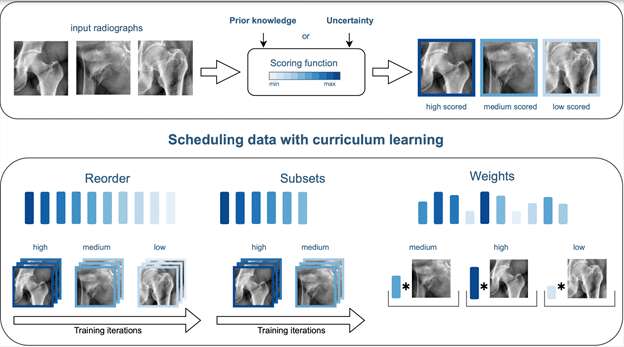
Curriculum federated learning
A potential solution to mitigate the frequent class-imbalance problem and to increase the size of annotated medical datasets is to employ data coming from multiple institutions. Federated Learning (FL) aims to train a machine learning algorithm across multiple decentralized nodes holding samples locally. Training such a decentralized model in a FL setup presents three main challenges: (i) system and statistical heterogeneity, (ii) data protection, and (iii) distributed optimization.
(i) We employ federated adversarial learning to deal with the alignment between the different domains. (ii) We leverage differential privacy to handle data protection. (iii) We propose a novel CL strategy for the FL setting (iii). We show that, by monitoring the local and global classification predictions, we can schedule the training samples to boost the alignment between domain pairs and improve the breast cancer classification performance.
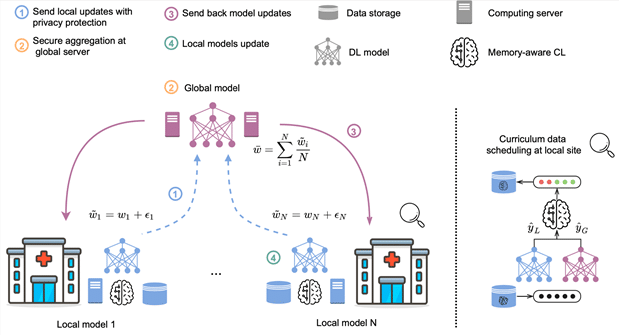
(*) Amelia would like to thank her advisors Gemma Piella and Diana Mateus for their support and guidance throughout these years. The work of this thesis would not have been possible without great collaborators and funders (EU’s Horizon 2020 Marie Skłodowska Curie programme and “La Caixa” Foundation).
Keep reading the Medical Imaging News section of our magazine.
Read about RSIP Vision’s R&D work on Medical Image analysis.

